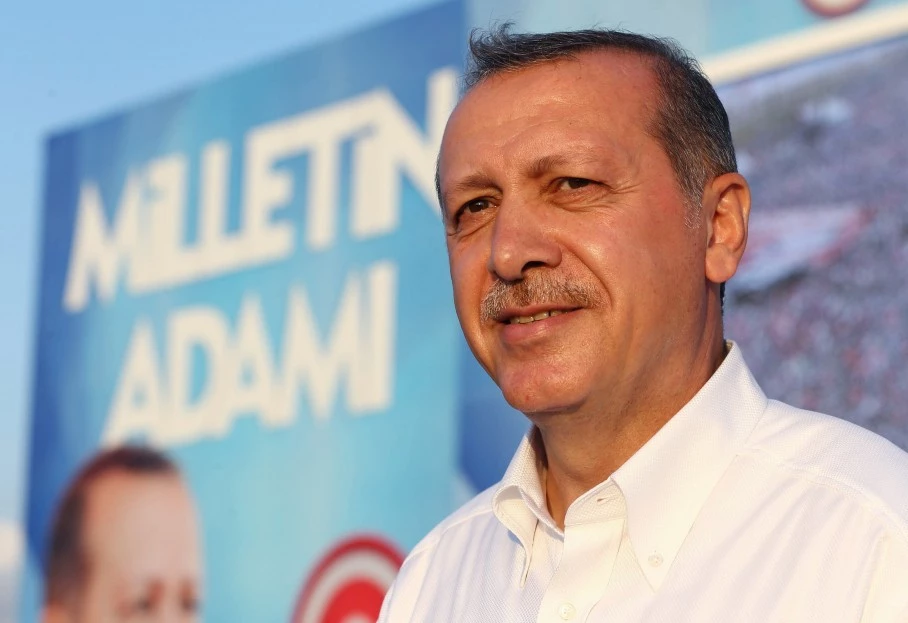By Adam Taylor August 6 at 11:45 AM
Turkish Prime Minister Recep Tayyip Erdogan addresses his supporters in Istanbul. (Kayhan Ozer/Turkish Prime Minister’s Press Office via Associated Press)
In a television interview Tuesday, Turkish Prime Minister and presidential hopeful Recep Tayyip Erdogan complained that people had questioned his family background.
“I was called a Georgian. I apologize for this, but they even said [something] worse: They called me an Armenian,” Erdogan said during an interview with NTV, according to a translation from Today’s Zaman newspaper. “But I’m a Turk.”
The comment immediately sparked outrage, with CNN-Turk asking on Twitter whether it was really so “ugly” to be an Armenian and others accusing Erdogan of racism:
Erdogan is known to be a skilled orator, and this may have been just a slip of the tongue, but the history between Armenians and Turks make his comments especially ill-advised. In 1915, during the dying days of the Ottoman Empire, soldiers slaughtered hundreds of thousands of ethnic Armenians living in what is now Turkey. Armenians and historians alike refer to it as a genocide, though Turkey and, notably, the United States have officially refused to use that terminology.
The Turkish prime minister is just days away from his bid to become president and is facing considerable backlash after more than a decade of authoritarian rule. And while his Justice and Development Party (known by its Turkish initials AKP) is known for its combination of capitalism, nationalism and Islamist governance, it has made significant inroads among Turkey’s minority communities.
Erdogan enjoys good support in the Kurdish-dominated southeast of the country, for example, and the AKP has pushed policies that supported Kurdish linguistic and cultural rights. If Erdogan wants to become president, this Kurdish support may well be vital. There are also signs that Erdogan had hoped to reach out to Armenians before his election, with reports that Turkey might open the Alican border crossing between the countries. Erdogan even took a tentative step toward acknowledging Turkey’s role in the mass killings of Armenians, offering condolences for the “inhumane” acts (his comments, while unprecedented, left many Armenian observers cold: One complained that Erdogan had used “euphemisms and the age-old ‘everyone suffered’ denialist refrain”).
Despite this, Erdogan has been criticized for repeatedly talking about ethnic and religious differences in what appears to be a bid to shore up his support among his Sunni Islam base. Earlier this week, he had called on his rivals to be clear about their backgrounds. “I am a Sunni, Kemal [Kılıcdaroglu of the Republican People’s Party, or CHP] is an Alevi [a branch of Shiite Islam], Selahattin [Demirtas, presidential candidate of the Peoples’ Democratic Party] is Zaza [a type of Kurdish people],” he said, according to Hurriyet Daily News, later adding. “I respect Alevis. Just as I make my sect public, so should he.”
70,000 or so Armenians still call Turkey home, and many in that community felt marginalized or even threatened before the comments. Erdogan often uses “extremely aggressive and bellicose language when referring to the Armenians or Armenian issue,” Richard Giragosian, an American-born Armenian analyst, told Today’s Zaman in July. Erdogan may have made an unfortunate verbal slip on Tuesday, but to critics it confirms their worst fears.
Adam Taylor writes about foreign affairs for The Washington Post. Originally from London, he studied at the University of Manchester and Columbia University.
via Is ‘Armenian’ an insult? Turkey’s prime minister seems to think so. – The Washington Post.
